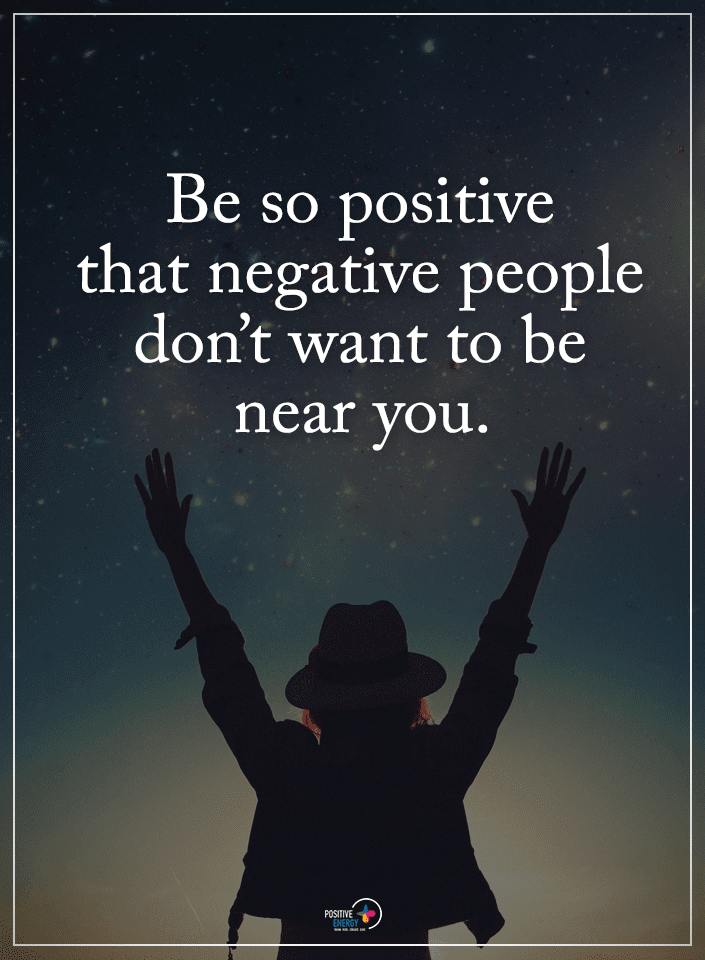The people who surround you influence a lot of your life. Good people lift you up while negative people drag you down. If you’re seeking to get anywhere in life, you want to be surrounded by positivity, and you should do everything you can to make that happen – so why is everyone around you so negative?
For a lot of people, this can be confusing. It can make them question whether they truly are a good person, thinking that birds of a feather flock together. It can make them feel like they’re getting nowhere in life. But before you start panicking, practice some positive thinking!
Negative people often feed off of and feel attracted to certain traits in others. These traits aren’t necessarily bad ones, but they’re often not the best, and they can cause toxic energy to swarm around you. So how can you stop it?
Here Are 6 Behaviors To Avoid To Stop Attracting Negative People In Your Life
1. Dwelling On Failure
We all know how disappointing failure can be. It can be as simple as something that just doesn’t go as planned and isn’t technically a “failure,” like a date that doesn’t go well, messing up a conversation, or breaking a diet. And of course, it can be as serious as losing a job, breaking off a relationship, or missing out on a big promotion.
If you’re someone who is always gunning for success, you may be overly perfectionistic. You may hold yourself to a very high standard that is, at times, unrealistic. This can cause you to be unnecessarily negative about perceived failure, and this will affect your entire outlook and reduce your positive thinking.
The problem is that holding onto negativity like this drags you down. What you’re essentially doing is messing up your chances of ever getting out of this phase of negativity. This creates a pattern where you blame yourself or others for one specific event or issue and never truly leave that headspace.
There’s something very important and freeing about letting go. Understand that mistakes are part and parcel of life and that your value is not determined by them.
2. Emotional Baggage
Our past experiences shape us. This is a fact. What we go through, no matter how difficult, helps to make us stronger. That’s why so many of us are completely different people today than we were before a traumatic, difficult, or even sad event occurred.
But there’s a difference between understanding and remembering past experiences and allowing yourself to be defined by them. Unfortunately, all the negativity that comes with emotional baggage like this can attract negative people.
It is completely valid and reasonable for you to have, as many people call them, “issues” stemming from your past. If you’ve been through dark times, it makes sense that a part of you carries scars from that time. But centering your entire life around those dark times is unhealthy.
Recovery is easier said than done, but it is important to embrace the healing process and work on forgiveness so you can overcome the issues that stem from these experiences in a positive way. If you are struggling a lot with emotional scars and have difficulty overcoming them, consider speaking to a mental health professional. There is no shame in enlisting the help of a therapist or counselor.
3. You Don’t Have Boundaries
Being kind and generous is a good thing. But there’s such a thing as being too nice, and that allows people to walk all over you. Being a pushover attracts negative, toxic people who seek to use your easygoing ways to take advantage of you. Here are a few ways you may be allowing too much.
a) Listening
It’s good to be a great listener. But if you’re constantly listening, a toxic person can take advantage of this, especially if they have issues with narcissism. No matter how obviously you look impatient or uncomfortable, they won’t stop talking your ear off for hours.
To prevent this, limit your conversation from the get-go. From the start, you should know how much time you can (and are willing to) spend on an interaction. If you know someone is toxic, limit it even further.
Once time is up, use an exit line. For example, you might say, “It was so nice to catch up with you…” or “I’ve got to get back to…” or “We’ll talk later, but now I have to…” Make it abundantly clear that you are leaving right then, and there is no room for more talking.
b) Physical generosity
Someone who knows that you’re always willing to lend someone cash, help them with an errand, or do them a favor is going to use that against you. You need to learn to say “no” with a firm voice and no waiting apology. A toxic person may then try to guilt you into doing whatever they want – don’t listen to them!
These people perceive you as easy and vulnerable, and it’s important that you have the ability to raise your voice and stand up for yourself if need be. Once they know you can’t be pushed around, they’ll stop bothering you.
c) Emotional Generosity
If you’re willing to give everyone your time, answer to their needs, and respond to all of their correspondence immediately, some negative people will learn to expect that of you. They are likely to become worse and worse, demanding more and more of your time and energy with each passing day.
Know your worth. Recognize your own needs and time constraints. This can be tricky, as you might feel selfish for your decision. But focus on positive thinking and understand that your time and energy are valuable, and you get to decide how to spend it.
4. You Tend To Whine And Rant
Every now and then, you may feel the need to let off steam. Turning to a trusted friend or confidant to complain, or ranting about it to someone who cares, is a great way to do so. After all, expressing feelings of negativity can often ease them and help you get through them.
But what happens when complaining becomes a habit? There’s nothing wrong with groaning about the odd annoyance now and then, but what if that’s your constant state? It’s not healthy and, worse still, it can actually feed the negativity you feel as you fuel it by giving it too much attention.
Plus, whining a lot makes you appear to be a negative person. This is especially true if you over-complain about inconsequential things, like the weather, people you know, or random inconvenient events. You’re likely to attract other people who have a lot of negative thoughts, and you’re likely to push away positive people in your life if you’re always a negative nancy.
Of course, trying to force positive thinking when all you want to do is moan and rant isn’t easy. Instead of voicing them to anyone who will listen, try expressing your difficulties artistically. You can write in a daily journal, which allows you to reflect on and analyze these thoughts. You can create poetry, paintings, or songs. These are much healthier ways to express inner negativity.
5. Taking Things Personally All The Time
If you internalize everything around you, you’ll constantly be followed by a dark cloud that attracts negative people. This brings drama close and causes you to feel bad and upset by everything – including things that don’t involve you.
This can lead to people alienating themselves from you due to your sensitivity. Instead, you’ll have toxic friends who want to push your buttons to get the reactions they want. That’s why taking things personally all the time is one of the many behaviors to avoid to stop attracting negative people in your life.
Here are some steps to take to learn to stop taking everything so personally.
a) Don’t assume
If someone confronts you, don’t leap straight to bad conclusions. Stay calm and allow yourself to listen to the other person thoroughly before responding.
b) Be proactive, not reactive
If you automatically succumb to knee-jerk reactions to everything, you come across as impulsive or unhinged. Learn to put some space between your emotions and the situation around you so you can look at everything logically.
c) See through their perspective
Instead of leaping to the defense, put yourself in the shoes of the other person. Did they have a bad day that makes them grumpy? Are they just tired? Do they not even realize what they’re doing? You’d be surprised how rarely things are about you!
d) Seek clarification
If you go into an interaction with the goal of preserving your ego and pride, you’re doomed to fail. Focus on understanding the other person’s point of view so you can both move on.
6. Not Allowing Yourself To Be Happy
Happiness is a choice – to some degree. We don’t mean that your depression will be instantly cured the moment you “decide” to be happy. What we do mean is that you need to feel a desire to be happy, work towards it, and believe you are worthy of it in order to improve yourself.
We know, of course, that this is much easier said than done. But the first step you can take is giving yourself permission to be happy. You might think this is an odd thing to have to consider allowing yourself to do but ask yourself these questions:
- Does happiness make you feel uncomfortable or uneasy?
- Do you prefer a boring, monotonous lifestyle that is kept as neutral as possible, never crossing into happy territory?
- When you have a good day, do you automatically worry about anything sad that may happen to ruin it?
- Do you often wonder why and how everyone else can be so happy?
If you’re not used to happiness, it makes sense that other sad, negative people will be your main companions. Being around happy people might just make you feel awkward, after all. That’s why it’s important to understand that happiness is not meant to be a reward or a punishment, but part and parcel of life – something you deserve to have.
Final Thoughts On Behaviors To Avoid To Stop Attracting Negative People In Your Life
Even the best of people can wind up surrounded by the worst of “friends.” If you think you’re generally a pretty positive person but find yourself overwhelmed by toxic people, it’s time to examine your behaviors and see if you’re unwittingly attracting them.
Everyone encounters a toxic individual or two in their life. But if the only people you know – or a good portion of them – are negative, look inwards at yourself. You might be surprised to discover that some of your actions are drawing them in. Learn to adapt, correct your errors, and step forward into a more positive space.


















